6+ SAMPLE Affiliate Marketing Plan
-
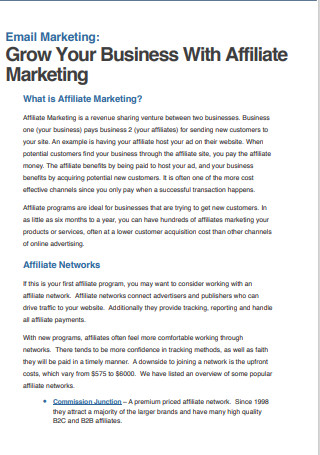
Affiliate Marketing Plan Guide
download now -
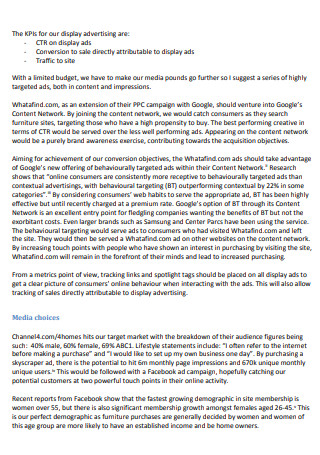
Digital Marketing Plan with Affiliate Strategies
download now -
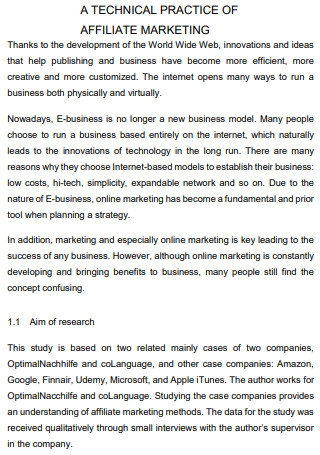
Affiliate Marketing Technical Practice Plan
download now -
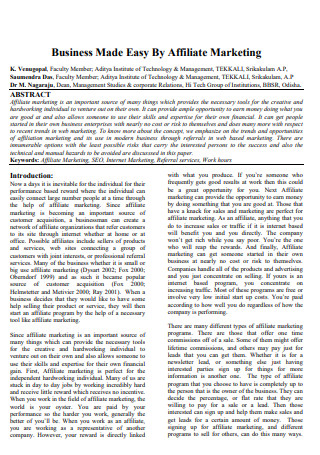
Affiliate Marketing Introduction and Plan
download now -
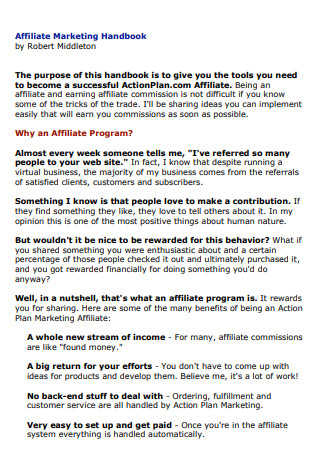
Affiliate Marketing Handbook for Business Planning Guide
download now -
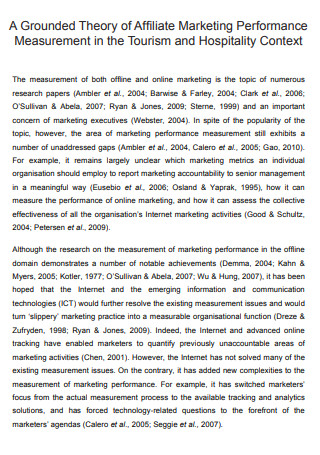
Affiliate Marketing Performance Measurement
download now -
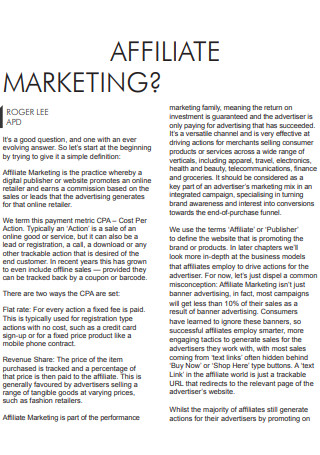
Affiliate Marketing Plan Template
download now
FREE Affiliate Marketing Plan s to Download
6+ SAMPLE Affiliate Marketing Plan
an Affiliate Marketing?
Benefits of Affiliate Marketing
Types of Affiliate Marketing Channels
How To Become a Successful Affiliate Marketer
FAQs
Why are affiliate marketers so ineffective?
Is it possible to use affiliate links on Facebook?
How much money do inexperienced affiliate marketers earn?
What Is an Affiliate Marketing?
Affiliate marketing is a method in which an affiliate promotes a business’s products and services in exchange for a commission when a transaction is made. An affiliate is a person who enables products and services through their networks and internet marketing capabilities. Affiliate marketing and the usage of affiliate marketers are a type of performance-based advertising that has several advantages for both the business and the marketer. Both parties benefit from increased sales and brand exposure when a product is outstanding, and the marketers’ online marketing abilities complement one another. Affiliate marketing is a good strategy for any business looking to expand. It’s sales without the need for conventional advertising. Developing your affiliate marketing strategy takes time and entails engaging folks and providing them with the tools they need to support your brand and products. Businesses and marketers most frequently use affiliate marketing in the field of online marketing. It can also incorporate offline and physical sales if the corporation so wants. Successful affiliate marketers can make over five figures every month. Affiliates who achieve this special status are frequently referred to as “super affiliates.” However, only around 1% to 5% of marketers attain this level of success.
Benefits of Affiliate Marketing
Businesses are increasingly incorporating affiliate marketing into their strategy today. Affiliate marketing allows companies to efficiently sell a product on a shoestring budget, with minimal work and time commitment, and with a low-risk profile, all while ensuring a high return on investment, increased brand awareness, and business growth. Naturally, some things sound too good to be accurate, but in this case, the benefits result from highly focused and clever marketing. Affiliate marketing enables businesses to determine a target market and select the optimal representatives to represent the name. Before you begin, you should train yourself on the best practices and strategies that will enable you to execute your affiliate marketing strategy flawlessly. Let’s study some of the primary benefits of implementing it as a strategy.
Types of Affiliate Marketing Channels
Most affiliates use similar procedures to keep their audience engaged and open to purchasing offered products. However, not all affiliates market their items in the same manner. Indeed, they may employ a variety of diverse marketing channels.
1. Influencers
An influencer is a person who can significantly impact the purchasing decisions of a comprehensive portion of the population. This person is well-positioned to benefit from affiliate marketing. They already have a sizable following, which makes it straightforward to guide consumers to the seller’s goods via social media posts, blogs, and other interactions with their supporters. Influencers have then paid a portion of the earnings they helped generate. Influencer marketing initiatives are especially prevalent on Instagram, where marketers collaborate with influencers viewed as authority or experts in their respective fields. Depending on the arrangement, a campaign may include a series of photo-accompanied product evaluations, account takeovers, or live videos. While an influencer may have their branding and aesthetic, it is critical to incorporate components related to your business to achieve brand recall and identification.
2. Bloggers
Bloggers excel at raising a seller’s conversions due to their ability to rank organically in search engine queries. The blogger tastes the product or service and then produces an in-depth review that persuasively supports the brand, directing visitors back to the seller’s website. The blogger is recognized for spreading the word about the product’s value, thereby assisting the seller in increasing sales.
3. Microsites devoted to paid search
Creating and monetizing microsites can potentially generate a significant amount of revenue. These sites are promoted within a partner site or on a search engine’s sponsored lists. They are different from the organization’s primary location. Microsites enhance conversions by providing targeted, relevant material to a specific audience through short and straightforward calls to action.
4. Email lists
Despite its dated origins, email marketing remains a viable affiliate marketing revenue stream. Certain affiliates have email lists that they can advertise the seller’s products. Others may use email newsletters to promote products and receive a commission when the consumer makes a purchase. Another option is for the affiliate to create an email list gradually. They acquire emails in bulk through their various campaigns and then send out emails about advertising.
5. Large media websites
These sites are designed to create large amounts of traffic at all times to reach millions of personalities. These websites use banners and contextual affiliate links to promote products to their large readership. This strategy provides greater exposure and increases conversion rates, resulting in higher profits for both the seller and the affiliate.
How To Become a Successful Affiliate Marketer
Step 1: Establish rapport.
When you’re just starting affiliate marketing, you’ll want to create an audience with really specialized interests. This enables you to personalize your affiliate campaigns to that area, enhancing your conversion rate. By establishing oneself as an expert in a single field rather than advocating a wide variety of things, you can market to the most likely to purchase the product.
Step 2: Personalize it.
There are numerous products that you can promote. You’ll be able to select things you believe in personally, so ensure that your ads focus on actual value products that consumers will like. You’ll increase your conversion rate while also establishing the loyalty of your trademark. Also, you’ll want to improve your email outreach skills to collaborate with other bloggers and influencers.
Step 3: Begin by evaluating items and services.
Concentrate on reviewing products and services related to your niche. Then, using the connection you’ve developed with your audience and your authority, explain to your readers why they should buy the product or assistance you’re offering. Almost everything sold online can be evaluated if there is an affiliate program — you can review material things, digital software, or even internet-booked services such as ride-sharing or travel resort reservations. Comparing this merchandise to others in the same category is highly effective. Most importantly, ensure that your content is precise and articulate to increase conversions.
Step 4: Utilize multiple sources.
Instead of relying just on email campaigns, invest time monetizing your blog, interlacing with your followers on social media, and even examining cross-channel promotions. Conduct a series of tests to see which marketing methods your audience responds to the most. Utilize this approach frequently.
Step 5: Choose your campaigns carefully.
You’ll make less money on a lousy product than you will on a valuable one, no matter how brilliant your marketing talents are. Take the time to research a product’s market before advertising it. Before collaborating, make sure to research the supplier thoroughly. Your time is essential, and you want to make sure you’re investing it in a successful product from a reputable supplier.
Step 6: Maintain an awareness of current trends.
Affiliate marketing is a highly competitive field. You’ll want to stay on top of any new trends to maintain your competitive edge. Additionally, you’ll almost certainly be able to benefit from at least a few of the continuously evolving marketing tactics. Ensure that you stay modern on all of these new tactics to ensure that your conversion rates, and hence revenue, are as high as possible.
FAQs
Why are affiliate marketers so ineffective?
Affiliate marketing is all about linking customers and sellers, and most marketers believe it is a simple activity that can be completed fast. However, on a practical level, it demands prudent techniques, to begin with. Numerous folks fail due to a lack of knowledge on how to start promoting the brand’s merchandise.
Is it possible to use affiliate links on Facebook?
While affiliate marketing is permitted on Facebook, you must always adhere to the social network’s advertising restrictions. Facebook, like Google, is entirely focused on the user experience. It is not in Facebook’s interest to allow marketers to direct users to dubious landing pages offering ‘get rich quick schemes.
How much money do inexperienced affiliate marketers earn?
The majority of affiliate marketing newbies earn less than $20,000 per year. Nearly half of affiliate marketers make less than $100,000 per year with some experience. A small percentage of affiliate marketers earn more than $1,000,000 every year. Affiliate marketing requires time and effort to develop into a full-time business.
Affiliate marketing has numerous benefits for organizations, and the majority of businesses may take advantage of them. Using affiliates to establish a new sales channel or increase your online marketing prospects is a plan that can have a massive impact on your organization. Affiliate marketing is a low-cost method of promoting a company and its products through various channels without paying a fortune. The growth of affiliate networks enables businesses to quickly launch, maintain, and, crucially, attract new affiliates to promote their brands. Regardless of your approach, it is a necessary component of a marketing plan to increase sales, vary your advertising strategies, or increase brand awareness among new populations. Establishing and sustaining positive relationships with affiliates is critical to a campaign’s success.
